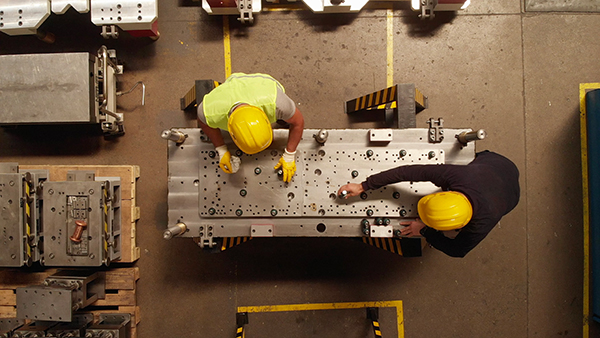Creating a singular unit between human and machine.
When it comes to modern manufacturing, much of the focus and attention is drawn to technology and machinery. The desire to enter and sustain Industry 4.0 operations causes many manufacturers to get caught up in the elements that accompany it, which include cloud, IoT, security and AI and automation.
While this is all important, there’s a critical element missing: closing the management gap.
What are machines without critical thinking behind them? Yes, we rely on machines and technology to operate seamlessly on their own, but without knowledgeable management, this isn’t feasible. Rather, without management, it’s an aimless path. Moving forward, we must implement the technology and the management system at the same time — they must advance as one moving force.
Many manufacturers have the capabilities of predictive maintenance, machine learning and robotics processes. That said, these factories have holes to fill and progress to make to become resilient.

Resilient manufacturers include digital supply chains and intelligent lots, but most importantly, they include knowledgeable management. How do you use technology to teach an average worker to become an advanced worker? It starts with investing in a management system that is parallel to that of the technology investments.
Considering that manufacturers look to make all tech on the factory floor as smart as possible, why not the same with factory workers? We rely heavily on managers and directors to bridge the gap with the machines, but if we begin to shift the mindset and equip those operating these machines daily with the necessary knowledge, then not only does their productivity and value increase, but so does that of the machine. This is the ultimate goal: to maximize machine productivity. Ironically, the only thing holding us back is our ability to limit our own value and knowledge.
Not only are these factories that close the management gap increasing productivity and output, they are also teaching and training more skilled workers. For them, the value of a factory worker increases, and in turn, the desire to enter the field increases. Especially in today’s environment where manufacturers are experiencing a labor shortage, this will help flood factory floors with skilled and knowledgeable workers. Wages will increase as skillsets strengthen, but parallel to that will be an increase in output and production, which will ultimately heighten bottom lines.
What’s more, this will help differentiate a manufacturer from competitors, as the factory floor will develop a consistent workflow, there will be less hiring and there will be better communication, ultimately increasing productivity and employee well-being.
The benefits will be felt not only within the factory but also outside the four walls — enabling the development of a smart supply chain with a connected customer. Here is where we see the connection of the triple threat between human, machine and customer. In a two-year span where we’ve seen more supply chain issues than recent memory, and no signs of improving, the ability to operate a seamless and connected supply chain is more important than ever. It has become necessary to minimize maintenance times due to lack of knowledge or expertise, as a resilient operation would already be in place due to past learning and wide-spread knowledge. The average worker becomes an advanced worker, and with that, the development of an advanced supply chain comes into effect.
Through proactive planning, vision and positioning, as well as extensive instruction and other strategic implementations, we will arrive at a place where we will start asking, “What can we learn from the data?” This is the destination and the pinnacle of machine learning. The machine will only go as far as we take it. So, to train the machine, you must first train yourself, your colleagues and each brain that occupies the factory floor. Together, the human and the technology will become one cohesive and unstoppable unit that will catapult your factory and production into a true Industry 4.0 reality.
To learn more, visit: https://www.wipfli.com/industries/manufacturing-and-distribution

Mark Stevens is Principal at Wipfli LLP. Mark leads Wipfli’s manufacturing and consulting practice. With a passion for helping manufacturers become more customer-effective and operationally efficient — and with more than 25 years in the manufacturing industry — he guides manufacturing companies through all facets of operational excellence and technology integration.
Scott Ellyson, CEO of East West Manufacturing, brings decades of global manufacturing and supply chain leadership to the conversation. In this episode, he shares practical insights on scaling operations, navigating complexity, and building resilient manufacturing networks in an increasingly connected world.